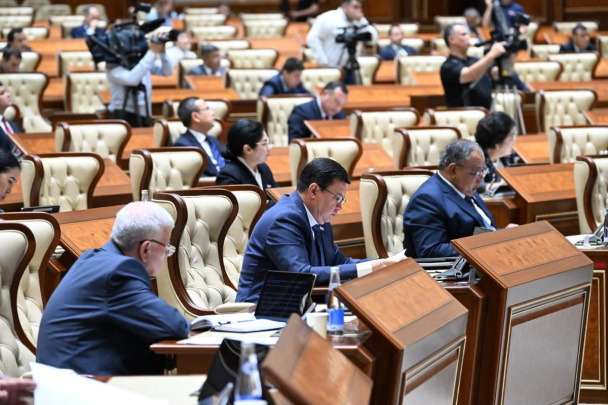Uzbekistan takes steps to regulate AI with new legislation
A new law regulating artificial intelligence (AI) is being adopted in Uzbekistan, introducing requirements such as labeling AI-generated products when published in media or online. Individuals who illegally process or distribute personal data using AI may face confiscation of their tools, up to 15 days of administrative detention, or fines of up to 37.5 million UZS. The law passed its first reading in the Legislative Chamber of the Oliy Majlis.

Photo: Alamy
On April 15, the Legislative Chamber of the Oliy Majlis adopted the draft law "On Regulating Relations Arising from the Use of Artificial Intelligence" in its first reading. The law was initiated by a group of deputies.
According to Deputy Shahnoza Kholmukhamedova, "AI is posing threats to human rights and personal data security worldwide, including in Uzbekistan."
"In particular, last year, the falsification of audio, photos, and videos of well-known individuals using AI increased by 50 times. In Uzbekistan, 1,129 illegally processed AI-generated materials were identified on the internet in 2023, and 3,553 in 2024. These materials often used the likeness or voice of others to gain public trust," she said.
Kholmukhamedova emphasized that these developments highlight the need to regulate AI-related activities through national legislation.
"Furthermore, our President, at the first plenary session of the Legislative Chamber, recommended establishing a legal framework to regulate AI-related issues. This draft law was developed in response to that directive," she added.
As is customary, the deputies did not publish the text of the draft law or subject it to public discussion.
The undisclosed draft proposes amendments to the Law "On Informatization" and the Code of Administrative Responsibility.
According to the rapporteur, the draft defines the concept of "artificial intelligence," outlines the main directions of state policy in the field, specifies the responsibilities of the authorized body, and establishes general rules for using AI in creating information resources and operating information systems.
The law mandates labeling for information resources created using AI technologies.
Additionally, the draft prohibits the unlawful processing and dissemination of personal data using AI technologies through media, social networks, or the internet. It proposes administrative penalties for violations, though the deputies did not disclose specific penalties.
Deputy Alisher Kadirov noted that amendments to Article 46 of the Code of Administrative Responsibility are being introduced:
"Those who illegally process and distribute personal data using AI will have their tools confiscated, face up to 15 days of administrative detention, or be fined between 50 and 100 times the base calculation amount."
This information was not mentioned during the live broadcast of the chamber's session.
According to lawmakers, the draft was developed by studying the experiences of the United States, Europe, East Asia, and CIS countries, and was coordinated with relevant ministries and agencies.
The draft also includes requirements to ensure that AI-generated information resources and AI-based information systems do not violate human rights, life, health, freedom, dignity, or other inalienable rights. It further stipulates that decisions affecting human rights and freedoms should not rely solely on conclusions drawn from AI-generated resources or systems, as stated in the Legislative Chamber’s Telegram channel.
Following Kholmukhamedova’s presentation, Deputy Ekaterina Smesova emphasized the importance of AI and the necessity of the law for society. She inquired about who would oversee compliance with the law’s requirements.
"Once this law is adopted, normative-legal acts will be developed to detail how labeling will be implemented and by whom. Naturally, individuals who create AI-generated information products and publish them in media or online will be required to label them," Kholmukhamedova responded.
Deputy Zafar Khudoyberdiev asked about the specifics of labeling AI-generated information and why the proposed amendment to the Code of Administrative Responsibility did not include penalties for failing to label. Deputy Ilhom Abdullaev responded:
"This law does not designate specific bodies to oversee the AI sector. If offenses such as defamation or mockery are committed using AI, responsible agencies will handle them under existing provisions. The only change here is the form of the offense.
In Europe, numerous regulations have been adopted to regulate AI use. In the U.S., especially after the new president took office, restrictions have been lifted to promote technological development. We aim to establish the concept of AI in the legal framework and define the basic rules and actors, rather than imposing bans, restrictions, or controls."
According to Abdullaev, labeling AI products is not akin to certifying a product. The goal is to distinguish digitally created products or artworks generated by AI and to indicate their origin. The labeling procedure will be determined by a government resolution.
Deputy Aziz Akbarov proposed amending Article 46-2 of the Code of Administrative Responsibility.
"Liability is currently limited to personal data. I proposed yesterday at the faction meeting that we include liability for actions that harm the state’s image, contradict our people’s national interests, or discredit historical figures. Including this in the draft law now would be appropriate," he said.
The draft law passed its first reading, with 130 deputies voting in favor, three remaining neutral, and no votes against.
Related News

15:11 / 03.06.2025
Traffic fines in Uzbekistan to increase from August 1: Full list

20:35 / 29.05.2025
Senate approves travel ban for suspects not in custody

14:13 / 29.05.2025
Uzbekistan joins global movement to end violence against children

13:04 / 29.05.2025



